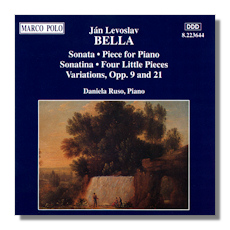
The Internet's Premier Classical Music Source
Related Links
- Latest Reviews
- More Reviews
-
By Composer
-
Collections
DVD & Blu-ray
Books
Concert Reviews
Articles/Interviews
Software
Audio
Search Amazon
Recommended Links
Site News
 CD Review
CD Review
Ján Levoslav Bella

Piano Music
- Sonata in B Flat minor
- Sonatina in E minor
- Variations on "In Pressburg, by the Danube" Op. 9
- Variations on "A Swarm, a Swarm is Flying" Op. 21
- Piece in C minor
- Four Little Pieces
Daniela Ruso, piano
Marco Polo 8.223644 DDD 74:18
In the 19th century, most nationalist roads either begin or end in Liszt, for some reason. I suppose it has to do with Liszt's extraordinary catholicity of taste. He met and promoted more than his share of up-and-comers, including Schumann, Grieg, Fauré, and members of the Mighty Five, who regarded him as a soul brother. The liner notes of this CD try to make a case for Bella (1843-1936) as an early Slovak nationalist, but the writer really must walk down a hard road. True, Bella uses folk songs and dances as his themes, but they all get pressed into the Lisztian mold. As an artist (at least in these works; I don't know any others), he is about as Slovakian as Pietro Tchaikovsky is Italian.
Again, the idiom is almost pure Liszt, but within it Bella does some pretty amazing things. For one, the sonata demonstrates his grasp of large-scale form, much surer than Liszt's. He manages to unite Lisztian harmonic changes and motific development with sonata form with much less torture than Liszt himself. On the other hand, he follows roughly the same procedure in each movement: a first theme, a second theme related to the first, and a lyrical theme, all pressed into exposition, development, and recapitulation. He differs from Liszt's own symphonic practice in that he is less sidetracked by fascinating tangents. He is far more single-minded in pursuing his plan. I must admit that I have almost moral reservations about the Liszt idiom. When I first began composing myself (around age 11), that's where I began, all full of pre- pube Sturm und Angst. Consequently, when I encounter it again, it's a bit like remeeting a member of the "bad crowd" I was once part of.
Those who have no such hang-ups and can enjoy Liszt without guilt might very well turn to this disc. The harmonies are not quite as picant and the piano writing doesn't quite make your jaw drop (after all, the point of a great deal of Liszt), but, as I said, Bella's form meanders less and the piano writing is expert, full, texturally varied, and shows off the contrapuntal voicing in clear light. All of the pieces, including the Sonatina, call for a piano pro (be careful when you try these at home!).
Daniela Ruso does beautifully. Enthusiasts for the late Romantics in general and the Marco Polo label in particular may recall her CD of chamber music by Franz Schmidt (Marco Polo 8.223415), including the Clarinet Quintet and solo piano works. Her performance here of Bella's two sonatas (the Piece for Piano actually consists of two movements to an incomplete piano sonata) has such power, drive, and clarity of both texture and overall form that she convinced me, at least, that Bella might have made a pretty good symphonist. Marco Polo's sound is quite fine, imitating an intimate, lively room, rather than the concert hall.
Copyright © 1998, Steve Schwartz


















